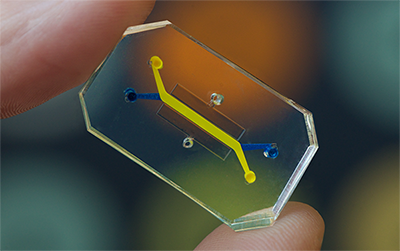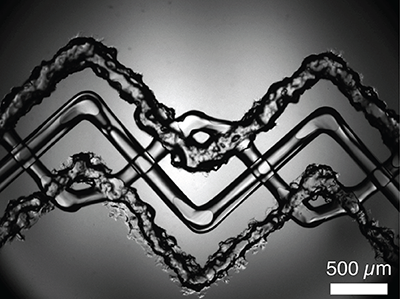Donald Ingber and Jennifer Lewis have been recognized as distinguished American inventors whose technologies are poised to benefit society
(BOSTON) — Today, the Wyss Institute for Biologically Inspired Engineering at Harvard University has announced that two of its Core Faculty members have been elected to the National Academy of Inventors (NAI). Wyss Institute Founding Director Donald E. Ingber, M.D., Ph.D., and Wyss Institute Core Faculty member Jennifer A. Lewis, Sc.D., are recognized by NAI for having demonstrated “a highly prolific spirit of innovation in creating or facilitating outstanding inventions that have made a tangible impact on the quality of life, economic development, and the welfare of society”.

In addition to leading translational research efforts as core faculty at the Wyss Institute, Ingber is the Judah Folkman Professor of Vascular Biology at Harvard Medical School and the Vascular Biology Program at Boston Children’s Hospital and Professor of Bioengineering at the Harvard John A. Paulson School of Engineering and Applied Sciences (SEAS), and Lewis is the Hansj_rg Wyss Professor of Biologically Inspired Engineering at SEAS. To date, Ingber has authored over 400 scientific papers and is an inventor on more than 130 patents, and Lewis has authored over 150 papers and is an inventor on more than 30 patents.
“I am honored to join this impressive group of scientists and engineers who are passionate about translating their discoveries and inventions into technologies that can make the world better for all,” said Ingber. “And it is an enormous pleasure to be elected as a fellow the same year as Jennifer Lewis, who is both transforming the future of 3D printing and doing the hard work to see it translated into products that can be put into the hands of users world-wide.”
Ingber, a cell biologist and bioengineer and a founder of the emerging field of biologically inspired engineering, is a member of the National Academy of Medicine and the American Institute for Medical and Biological Engineering. Over the course of his career, he has led innovation at the frontiers of numerous disciplines including mechanobiology, tissue engineering, nanobiotechnology, and translational medicine, and has founded four companies to commercialize his technologies. Two of those companies have spun out of the Wyss Institute’s Biomimetic Microsystems Platform, where Ingber has led the development of human organs-on-chips and a sepsis therapeutic device, which are now being commercialized by Emulate, Inc., and Opsonix, Inc., respectively.

“I, too, am honored to join this distinguished group of inventors,” said Lewis, “alongside Don Ingber, who is transforming the fields of drug screening and biomedical devices through his cutting edge, translational research activities.”
Lewis, a materials scientist and 3D printing pioneer, is a member of the American Academy of Arts and Sciences and a fellow of the American Ceramic Society, the American Physical Society, and the Materials Research Society. She has advanced the field of materials science and assembly through the invention of new classes of printable materials and 3D printing techniques. Her development of microscale functional, structural, and biological inks has opened new pathways for fabricating novel devices such as 3D antennas, electronic sensors, and rechargeable microbatteries as well as vascularized living tissues. She founded the startup company Voxel8, Inc., to commercialize the world’s first multi-material 3D printing for the fabrication of embedded electronics and other state-of-the-art devices.
Ingber and Lewis will be inducted on April 15, 2016, at the Fellows Induction Ceremony at the United States Patent and Trademark Office in Alexandria, Virginia. Following their induction, the fellows will be honored at a private reception inside the National Inventors Hall of Fame Museum. The NAI Fellows Program currently has 582 fellows worldwide, representing more than 190 universities and governmental and non-profit research institutions. The NAI fellows collectively hold nearly 20,000 U.S. patents.